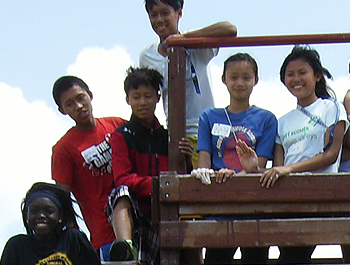Image

Rick Goodemann, CEO
Jennifer Prins, former Director of Community Development
Southwest Minnesota Housing Partnership
Challenge: After the 1980s farm crisis agricultural communities in Minnesota sought investment of state and local resources to diversify their economy. Now job growth has outstripped the local workforce and available housing. Communities struggle to provide services and homes for new residents from elsewhere in the state and around the world.
Southwest Minnesota Housing Partnership, based in Slayton, Minnesota, is a small nonprofit dedicated to "creating thriving places to live, grow and work through partnerships with communities." Our organization provides community planning, real estate development, grant administration services and educational programs to communities in 30 rural Minnesota counties.
Growth in healthcare and manufacturing industries helped our communities become more resilient to agricultural cycles, but they are also suffering from their success. We responded to burgeoning housing and community development needs by engaging local leaders and offering community planning and housing development expertise — not as proponents of our own specific projects, but as partners in meeting local needs. In 1992, in our first year of existence, two federally-declared disasters occurred in our region and we quickly offered help. We demonstrated our willingness to jump through hoops for federal funds, focus on community needs, present new ideas and bring allies to the table. As leaders in the disaster area began to talk, communities sought our assistance.
When the agricultural economy rebounded in Worthington, Minnesota (pop. 13,000) and economic diversification efforts took hold, the largest employer, a pork processor now affiliated with JBS, had difficulty finding employees and started recruiting from the Twin Cities and elsewhere. Today, over one-quarter of Worthington residents are foreign-born and 56 languages and dialects are spoken at JBS. The arrival of new residents outstripped the supply of housing. Unemployment remains low and housing vacancy is nonexistent.
 In 1995, our organization developed the first new rental project in the community in over 20 years. Our knowledge of housing finance and state program requirements meant that key data was collected on time to meet funding deadlines, critical partners were involved and community listening sessions were held.
In 1995, our organization developed the first new rental project in the community in over 20 years. Our knowledge of housing finance and state program requirements meant that key data was collected on time to meet funding deadlines, critical partners were involved and community listening sessions were held.After reviewing a requested housing study, we recommended potential new construction and rehabilitation projects, some of which were incorporated into the city’s housing plan. Among our recommended projects were the Willow Court Townhomes and several housing and commercial repairs funded by community development block grants. We listened and engaged new partners to deliver results and community leaders responded with their own proposals.
In the early 2000s we sought out more partnerships to meet local needs, identify barriers and increase engagement from diverse households. We developed relationships with Adult Basic Education, churches and employers to reach residents where they are comfortable and where language resources are available. JBS welcomed onsite resources for their employees because it helps them retain workers. Churches wanted their members to have their basic housing needs met in a safe and respectful way. Adult Basic Education needed relevant class topics and beginner-level home maintenance provided a safe space for new American students to ask questions and voice their housing needs. These relationships increased access and participation of new American households in seeking housing and becoming homeowners and business owners.
Some of our dozens of projects and partnerships that maximize health and safety, economic resiliency and community integration include:
- Home maintenance classes that introduced new American householders to home maintenance and created relationships with local home improvement businesses.
- Innovative multi-family projects that increased energy-efficiency and healthier living for over 200 households through improved ventilation and outdoor space.
- A former YMCA that was redeveloped into the Center for Active Living, an indoor-outdoor gathering space.
- Corrections work crew projects that enabled dozens of inmates nearing release to build marketable construction skills and work relationships while controlling construction costs for affordable housing.
- Housing inspection and rehabilitation programs that improved rental units and engaged landlords in meeting livability standards through rental ordinance and registration.
- Youth career and financial literacy programming that boosted engagement with diverse young people and connected youth with community development careers.
- Permanent supportive housing for long-term homeless households with services to support stability and success provided by Southwestern Mental Health Center.
- Commercial rehabilitation that made downtown a viable location for businesses. We secured microloans through a regional foundation to increase success of new American-owned business ventures.
- Focus on finding solutions.
- Work together.
- Ppush forward.
- Embrace a culture of "finding a way."

